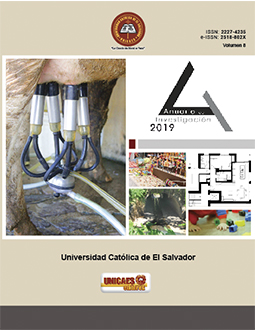Mechanisms that guarantee and protect the right to family housing in the department from Santa Ana
DOI:
https://doi.org/10.5377/aiunicaes.v8i0.8337Keywords:
Family housing, housing credit, housing rights, decent housing, cooperative association, banking institution, non-governmental organizationAbstract
The Salvadoran state, as a guarantor and protectionist entity of the fundamental rights of people, must ensure that the Salvadoran family possesses a home that has the minimum and necessary conditions for the personal development of its members, through the creation and implementation of public policies designed for that purpose.
However, the institutions or organizations involved in the housing issue have not been able to solve or reduce the housing problem for those families that may be benefited because some of their programs demand minimum requirements such as, for example, to receive a fixed monetary income.
In El Salvador there is a high percentage of the population that does not have a decent home where their family can develop productively; especially those socially and economically most vulnerable sectors, whose income is variable.
In this context, the research was based on available documentary information and interviews with the actors involved, with the purpose of analyzing the mechanisms that guarantee and protect the right to a family home.
It was evidenced that there is a housing deficit for those vulnerable sectors.
In addition, the mechanisms in place are not enough to ensure and enforce the right to housing, due to prevailing economic, social and cultural circumstances. It is necessary that the different public and private institutions work in a coordinated manner under the principle of co-responsibility and develop effective policies that achieve this universal right.
Downloads
331
Downloads
Published
How to Cite
Issue
Section
License
© Anuario de Investigaciones

